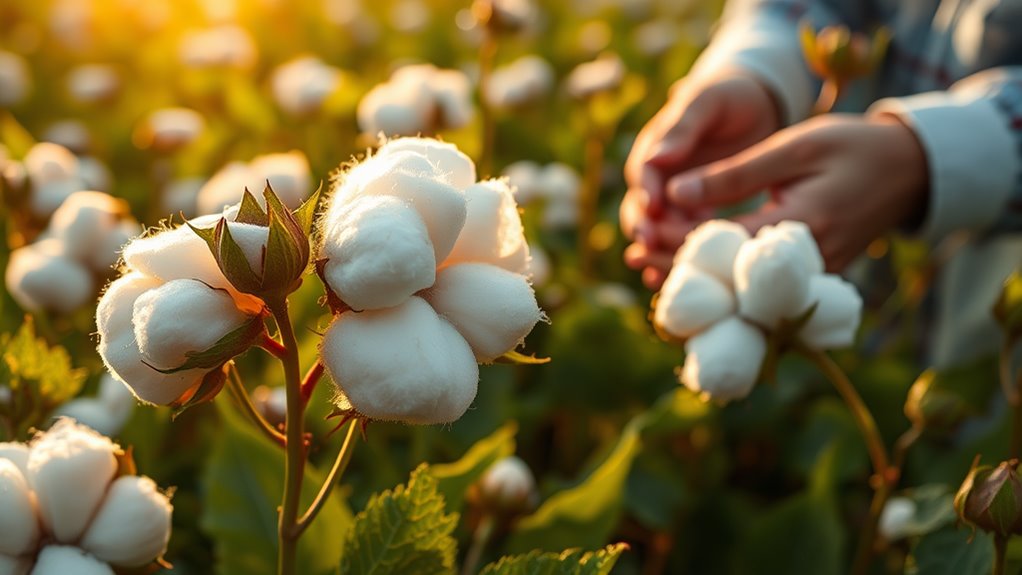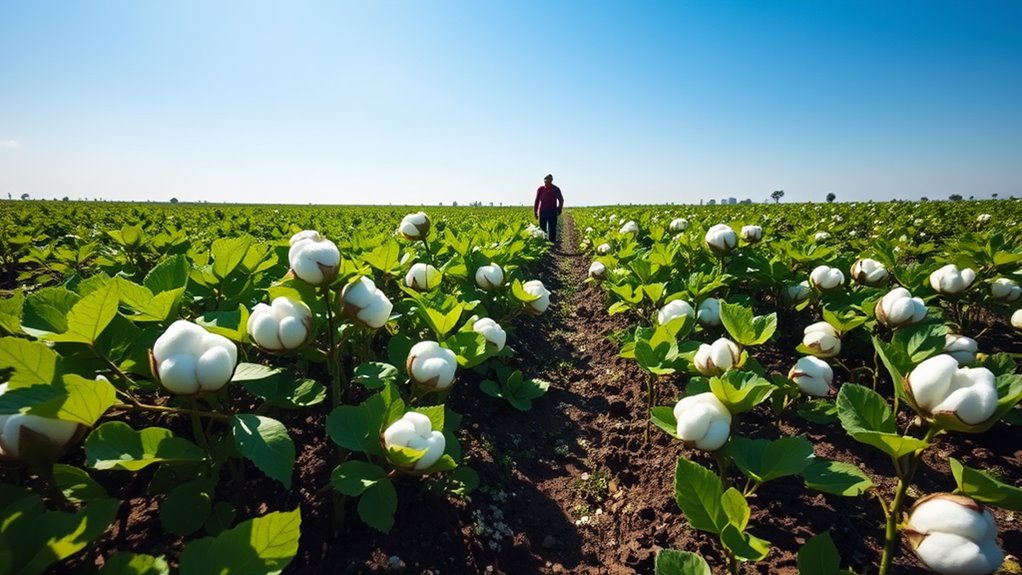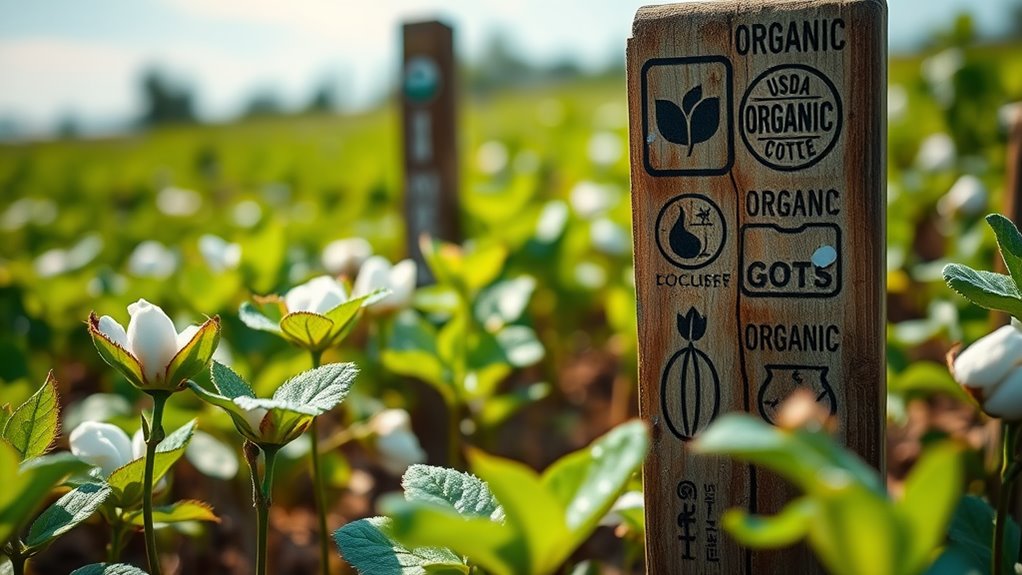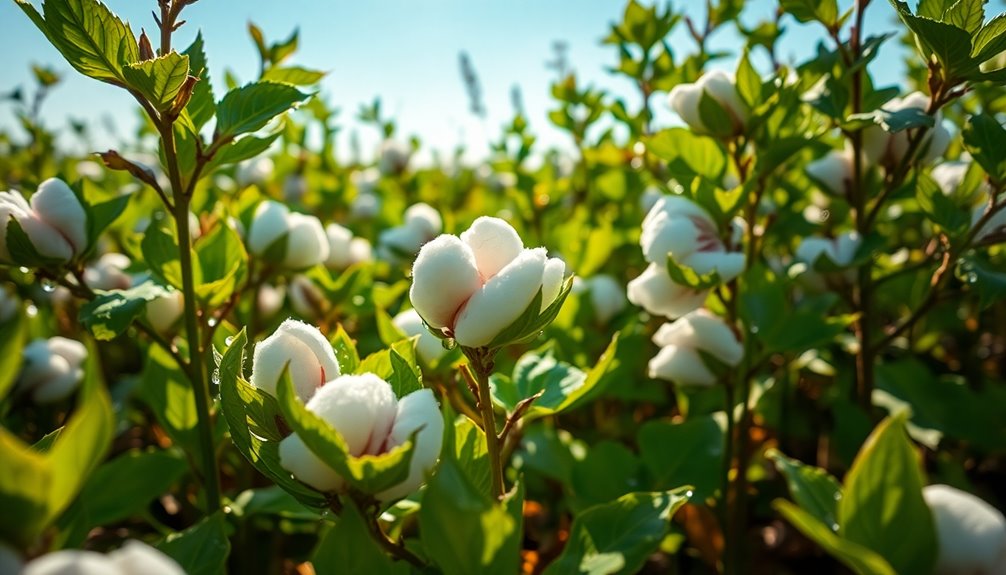Organic cotton is a sustainable textile choice that's grown without synthetic pesticides or fertilizers. It offers various environmental benefits, such as improved soil health and reduced water usage. Unlike conventional cotton, organic farming practices prioritize long-term agricultural health over short-term yields. Consumers can identify organic cotton products through certifications like GOTS and USDA Organic. Choosing organic supports fair trade practices and reduces exposure to harmful chemicals. Discover more about its benefits and care tips for a sustainable wardrobe.
Article Highlights
- Organic cotton is grown without synthetic pesticides or fertilizers, promoting environmental sustainability and healthier ecosystems.
- Choosing organic cotton reduces exposure to harmful chemicals and supports fair labor practices.
- Look for certifications like GOTS and Fair Trade to ensure authenticity and sustainability in organic cotton products.
- Organic cotton typically offers superior softness and breathability compared to conventional cotton, enhancing comfort.
- Proper care, such as washing in cold water and air drying, helps maintain the quality of organic cotton items.
What Is Organic Cotton?

Organic cotton is a sustainable alternative to conventional cotton, cultivated without synthetic pesticides or fertilizers. Its history timeline dates back to the early 1990s when consumer awareness about the environmental impact of conventional farming began to rise. As demand grew, farmers started converting to organic practices, leading to a significant shift in market trends. Today, organic cotton represents a notable segment of the textile industry, with brands increasingly adopting it to meet consumer preferences for sustainable products. This trend isn't just about eco-friendliness; it reflects a broader movement in the direction of ethical fashion. As more consumers prioritize sustainability, organic cotton continues to gain traction, reshaping the environment of textile production and encouraging more farmers to embrace organic methods.
The Environmental Benefits of Organic Cotton
As conventional cotton farming often depletes soil health and contributes to water pollution, the cultivation of organic cotton offers significant environmental advantages. Organic cotton farming practices emphasize sustainable agriculture, using natural fertilizers and pest control methods, which help maintain soil quality and biodiversity. This approach reduces reliance on harmful chemicals, protecting local ecosystems and waterways. Moreover, organic cotton requires less water than conventional methods, promoting more efficient use of this essential resource. By supporting organic cotton, consumers contribute to textile sustainability, encouraging practices that prioritize environmental health. The benefits extend beyond individual farms; they nurture a broader commitment to eco-friendly practices that can positively impact global agricultural systems. In the end, organic cotton represents a fundamental step toward a more sustainable future.
How Organic Cotton Is Grown

Cultivating organic cotton involves a careful approach that prioritizes ecological balance and soil health. Farmers utilize sustainable farming practices, emphasizing crop rotation and natural pest control, which improve biodiversity. Various cotton varieties, like Upland and Pima, are chosen for their adaptability to local conditions.
Here's a look at some key aspects of organic cotton cultivation:
| Aspect | Description | Importance |
|---|---|---|
| Soil Management | Use of compost and cover crops | Improves soil fertility |
| Pest Control | Natural predators and traps | Reduces chemical use |
| Crop Rotation | Alternating different crops | Prevents soil depletion |
| Water Conservation | Drip irrigation methods | Minimizes water waste |
| Seed Selection | Non-GMO, native varieties | Guarantees ecological resilience |
Through these methods, organic cotton farming nurtures the environment and produces high-quality fibers.
Differences Between Organic and Conventional Cotton
When comparing organic and conventional cotton, key differences emerge in farming practices, environmental impacts, and health benefits. Organic cotton relies on sustainable methods, whereas conventional practices often involve synthetic chemicals. Comprehending these distinctions can help consumers make informed choices.
Farming Practices Comparison
Though both organic and conventional cotton farming aim to produce high-quality fibers, their practices differ markedly in methods and environmental impact. Organic cotton relies on sustainable methods, such as crop rotation and natural pest control, to maintain soil health and biodiversity. On the other hand, conventional cotton often employs synthetic fertilizers and pesticides, which can harm ecosystems. Regarding yield comparison, organic farms typically yield less cotton per acre than their conventional counterparts because of these practices. Nevertheless, this lower yield is often offset by the long-term benefits of healthier soil and reduced chemical runoff. In the end, the choice between these two farming practices involves weighing immediate productivity against environmental sustainability and future agricultural health.
Environmental Impact Assessment
The environmental impact of organic cotton farming markedly differs from that of conventional cotton, primarily as a result of the methods employed in cultivation. Organic practices prioritize sustainability metrics, leading to reduced chemical usage and improved soil health. This approach encourages a positive biodiversity impact, supporting various ecosystems.
- Lower water consumption through improved agricultural techniques
- Improved soil fertility stemming from natural composting and crop rotation
- Increased habitat for pollinators and beneficial insects
- Reduction in greenhouse gas emissions linked to synthetic fertilizers
- Enhanced resilience to pests and diseases, lowering the need for pesticides
Health Benefits Analysis
Though many consumers may not realize it, the health benefits of organic cotton greatly surpass those of conventional cotton. Organic cotton is cultivated without harmful pesticides or synthetic fertilizers, making it a safer choice for skin health. The absence of these chemicals reduces the risk of irritation and allergic reactions, particularly for those with sensitive skin. Furthermore, organic farming practices promote biodiversity, which can lead to better overall soil health and, as a result, more nutritional advantages in the cotton itself. This approach not only benefits the environment but likewise supports the well-being of individuals who wear organic cotton products. By choosing organic, consumers are making a healthier choice for themselves and for the planet.
The Impact of Fast Fashion on Cotton Production
Fast fashion's rapid production cycles have significant environmental consequences for cotton farming, leading to increased pesticide use and soil degradation. Furthermore, the demand for cheap cotton often results in labor exploitation, with workers facing poor conditions and low wages. Comprehending these impacts is vital for those considering the benefits of organic cotton alternatives.
Environmental Consequences
As consumer demand for trendy clothing skyrockets, the environmental consequences of fast fashion on cotton production become increasingly alarming. The industry's reliance on conventional cotton farming practices contributes markedly to climate change and ecosystems' deterioration. This rapid production cycle leads to a heightened carbon footprint and biodiversity loss, as natural habitats are destroyed to make way for monoculture farming.
- Excessive pesticide and fertilizer use contaminates soil and water sources.
- Water-intensive cotton cultivation depletes freshwater resources.
- Soil degradation results from over-farming practices.
- Loss of native flora and fauna disrupts local ecosystems.
- Increased textile waste exacerbates landfill overflow.
Understanding these ramifications is essential for consumers seeking to make more sustainable choices in their clothing purchases.
Labor Exploitation Issues
How can consumers remain unaware of the labor exploitation tied to cotton production in the fast fashion industry? Many shoppers often overlook the harsh realities faced by workers who produce cotton for their favorite brands. In numerous countries, labor rights are frequently violated, with workers enduring unsafe conditions and receiving unfair wages. These individuals often toil long hours without proper compensation, making it difficult to support their families. Fast fashion's relentless demand for cheap materials exacerbates this issue, allowing brands to prioritize profit over ethical practices. By choosing organic cotton, consumers can support sustainable practices and promote fair wages. Awareness is vital; an informed choice can help shift the industry in the direction of respecting labor rights and improving the lives of countless workers.
Certifications and Standards for Organic Cotton

Maneuvering the terrain of organic cotton requires a grasp of various certifications and standards that guarantee its authenticity and sustainability. Certification bodies play an essential role in this process, ensuring that products meet strict organic standards. These certifications promote environmentally friendly practices and boost consumer trust.
- Global Organic Textile Standard (GOTS)
- USDA Organic Certification
- OEKO-TEX Standard 100
- Organic Content Standard (OCS)
- Fair Trade Certification
Each of these certifications reflects specific criteria, such as a prohibition on synthetic pesticides and fertilizers, along with adherence to fair labor practices. Comprehending these certifications helps consumers make informed choices, ensuring they're supporting truly organic and ethical cotton production.
How to Identify Organic Cotton Products
Wondering how to spot organic cotton products in a crowded market? It's crucial to look for specific indicators. First, check the product labeling for certifications like GOTS or OEKO-TEX. These labels guarantee the cotton meets organic standards. Furthermore, investigate the sourcing methods used by brands; ethical companies often disclose their practices.
Here's a quick reference table to help identify organic cotton:
| Indicator | What to Look For |
|---|---|
| Certifications | GOTS, OEKO-TEX |
| Sourcing Methods | Transparency in sourcing |
| Product Labeling | Clear organic labeling |
| Fabric Texture | Soft, breathable feel |
| Color | Natural dyes preferred |
The Benefits of Choosing Organic Cotton
Choosing organic cotton not merely supports sustainable farming practices, but it also benefits consumers in several significant ways. The organic cotton advantages extend beyond eco-friendliness; they improve the overall quality of the products.
- Reduces exposure to harmful chemicals, making it safer for sensitive skin.
- Offers superior breathability and softness compared to conventional cotton.
- Promotes biodiversity by encouraging healthier ecosystems.
- Supports local farmers and fair trade practices, contributing to community development.
- Diminishes water usage, aligning with organic cotton sustainability goals.
Sustainable Brands That Use Organic Cotton
Many sustainable brands are making a mark by incorporating organic cotton into their collections. From eco-friendly fashion labels to ethical textile producers, these companies prioritize both quality and environmental responsibility. Innovative organic cotton brands are likewise emerging, showcasing the versatility and benefits of this sustainable material.
Eco-Friendly Fashion Labels
As consumers increasingly prioritize sustainability in their fashion choices, eco-friendly labels are stepping up to meet the demand for organic cotton apparel. These brands emphasize transparency and ethical practices, often engaging in eco-friendly collaborations to further their sustainable fashion goals. They focus on creating stylish, high-quality products during minimizing environmental impact.
- Use only GOTS-certified organic cotton
- Implement fair labor practices
- Minimize water usage in production
- Promote recycling and upcycling initiatives
- Offer biodegradable or recyclable packaging
Ethical Textile Producers
As the demand for sustainable fashion continues to rise, ethical textile producers are leading the way by using organic cotton in their collections. These brands prioritize ethical sourcing, ensuring that their materials are grown without harmful chemicals and supporting biodiversity. They often engage in fair trade practices, which guarantee that farmers receive fair compensation and work under safe conditions. This commitment not only benefits the environment but likewise uplifts communities, encouraging a more equitable global economy. By choosing organic cotton, these producers demonstrate that style and sustainability can coexist. Consumers increasingly appreciate the transparency and integrity behind these brands, making ethical choices that promote a healthier planet and a just society.
Innovative Organic Cotton Brands
With a growing emphasis on sustainable fashion, innovative brands are stepping up by incorporating organic cotton into their collections. These brands not only prioritize eco-friendly materials but additionally emphasize brand transparency and sustainable innovation. By choosing organic cotton, they help reduce the environmental impact of textile production as they promote ethical practices.
- Patagonia: Known for its commitment to environmental responsibility, it uses organic cotton in many of its products.
- EILEEN FISHER: This brand focuses on sustainable materials, including organic cotton, to create stylish, timeless pieces.
- People Tree: Pioneering fair trade, it uses organic cotton to produce its fashionable, ethical clothing.
- Tentree: For every item sold, it plants ten trees, using organic cotton for its environmentally friendly apparel.
- Reformation: This trendy brand incorporates organic cotton into chic designs while maintaining a commitment to sustainability.
Tips for Caring for Organic Cotton Clothing
Caring for organic cotton clothing can be straightforward if one follows a few simple guidelines. First, regarding washing tips, it's best to use cold water and a gentle detergent to preserve the fabric's natural fibers. Avoid bleach, as it can damage the cotton and its color. Washing clothes inside out can likewise help minimize wear and tear.
For drying techniques, air drying is ideal. Hanging clothes in a shaded area prevents fading and shrinkage. If using a dryer, select a low heat setting to maintain the quality. Finally, storing organic cotton garments in a cool, dry place prevents moisture and mold. By following these tips, one can guarantee their organic cotton clothing remains soft and colorful for years to come.
Frequently Asked Questions
Is Organic Cotton More Expensive Than Conventional Cotton?
In terms of the price comparison between organic cotton and conventional cotton, organic cotton is typically more expensive. This higher cost can be attributed to the more labor-intensive farming practices and lower market demand, which affects economies of scale. Many consumers are willing to pay a premium for organic products, valuing sustainability and environmental impact. As awareness grows, the demand for organic cotton might increase, potentially influencing prices in the future.
How Does Organic Cotton Affect Skin Sensitivity?
When considering how organic cotton affects skin sensitivity, it is essential to highlight its hypoallergenic properties. Many people find that organic cotton reduces skin irritation compared to conventional fabrics, which often contain harmful chemicals and pesticides. This natural fiber is gentler on the skin, making it a suitable choice for those with sensitivities or allergies. Overall, organic cotton can provide comfort and reduce the risk of skin issues, promoting better skin health.
Can Organic Cotton Be Dyed Without Chemicals?
Can organic cotton be dyed without chemicals? Yes, it can! Using natural dyes derived from plants, fruits, and minerals, artisans embrace sustainable practices as they incorporate lively hues. These eco-friendly options not just improve the fabric's beauty but likewise align with the values of those who prioritize health and environmental responsibility. By opting for organic cotton treated with natural dyes, consumers can enjoy colorful creations without compromising their commitment to a greener lifestyle.
What Is the Lifespan of Organic Cotton Products?
The lifespan of organic cotton products often depends on their care and usage. Typically, they're known for their durability, especially when produced using sustainable practices. With proper maintenance, like gentle washing and avoiding harsh chemicals, these products can last for several years. Unlike conventional cotton, which may wear out quicker as a result of chemical treatments, organic cotton retains its quality, making it a long-lasting choice for consumers who value both sustainability and longevity.
Are There Any Downsides to Using Organic Cotton?
When considering the downsides of using organic cotton, one must note that although it's typically better for the environment, its farming practices can sometimes require more land and water compared to conventional cotton. Furthermore, organic cotton's production is often more labor-intensive, which can lead to higher costs. Some consumers may find that the price doesn't align with their budget, regardless of its benefits for the environment and reduced chemical use.













